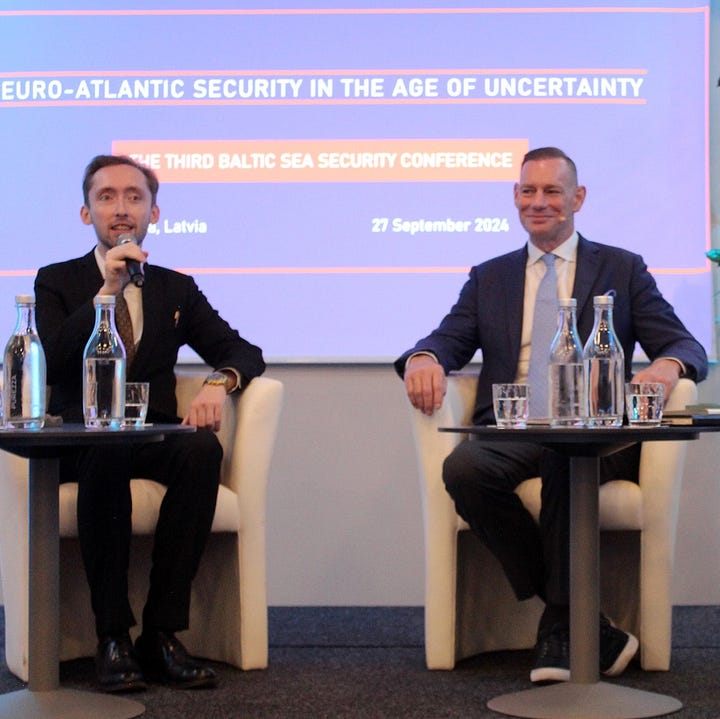Baltic Roundup | September 2024
By Indra Ekmanis - A look back at September in the Baltic states

Dear Readers,
A new graphic novel tells the story of Estonia's most celebrated living composer, Arvo Pärt. Now, a look back at September in the Baltic states.
Defense & Security
An armed Russian drone landed in Eastern Latvia having wandered across the border from Belarus. Māris Andžāns breaks down the situation for the Baltic Bulletin. And, Russian jets were intercepted over the Baltic Sea.
Lithuania held mobilization drills to practice moving to a wartime administration. They included a drill to evacuate individuals with disabilities, as well as tabletop and military exercises. Latvia began Namejs 2024 exercises with NATO, and Estonia wrapped the Põhjakonn military exercise focused on combat shooting and new weaponry.

Northrop Grumman signed an MOU with Lithuania on plans to produce ammunition in Vilnius. Local production could mitigate the risk of interruptions in supply for Lithuanian armed forces. And, German and Lithuanian defense ministers Boris Pistorius and Laurynas Kasčiūnas penned an op-ed on the German deterrent in the Baltic states.
The presidents of Estonia, Latvia, and Lithuania addressed the UN General Assembly with speeches that called out the veto power of Russia on the Security Council. Estonia and Latvia supported an adopted UN resolution demanding Israel end the occupation of Palestinian territories. Lithuania abstained.
Politics
European Commission President Ursula von der Leyen has laid out her incoming team of commissioners. Former Estonian Prime Minister Kaja Kallas is set to become Vice President and High Representative for Foreign and Security Policy. Valdis Dombrovskis, former prime minister of Latvia with a long tenure in the Commission, will head the Economy and Productivity, Implementation and Simplification portfolio. Former Prime Minister of Lithuania Andrius Kubilius will take on the new Defense and Space portfolio.
Latvia's Transportation Minister Krišjanis Birškens (Progressives) survived a third no-confidence vote in parliament. And, Krišjānis Kariņš (New Unity), former prime minister and foreign minister, resigned his seat. While the denouement of Kariņš's two-decade political career was clouded by a scandal involving the cost of chartered flights, he headed the longest-serving government in Latvian history, presiding over the COVID-19 pandemic and the start of Russia's full-scale war in Ukraine, and earning a decisive reelection victory.
Former Estonian Minister of Education Mailis Reps (Center) was found guilty of embezzlement and fraud for using ministry funds to cover personal expenses. The ruling may be appealed.

Economy & Energy
Estonia is planning for €1 billion in cuts over the next four years, according to Prime Minister Kristen Michal (Reform). A 2 percent tax on corporate profits will supplement defense spending, along with increased VAT and income taxes. However, the proposed 2025 budget bill is facing criticism.
Lithuania's economy minister says new funding for defense should come from economic growth rather than additional taxes. State funding for Latvian political parties will be frozen at 2024 levels next year as part of efforts to reduce public administration costs. And, the European Central Bank cut rates by a quarter of a percentage point for Eurozone countries.
The US Treasury Department's Financial Crimes Enforcement Network (FinCEN) withdrew a finding regarding Latvia's ABLV Bank as an institution of primary money laundering concern. FinCEN cited notable reforms made by the government of Latvia to strengthen and improve the sector banking.
For the Baltic Bulletin, Jason Moyer covers the Baltic states' planned decoupling from the Soviet-era BRELL energy grid and what that means for security.
Society
Latvia will restrict employers' ability to require Russian-language skills for positions where it is not justified and will ban the use of Russian on ATMs. In Lithuania, lawmakers are considering mandating foreign workers in some positions to serve clients in the local language. And, Estonia's new school year heralds the end of the Russian language education system.
An investigation by Re:Baltica looks at how misinformation about dragging the Baltic states into war with Russia is being spread.
Aitäh, paldies and ačiū,
Indra Ekmanis
Baltic Bulletin Editor
Baltic Sea Security Conference


FPRI’s Eurasia Program joined the Baltic Security Foundation alongside other European and American partners for the third Baltic Sea Security Conference: Euro-Atlantic Security in the Age of Uncertainty. Director Maia Otarashvili and Head of Research Bob Hamilton participated in panels regarding Black Sea regional security and the impacts of Russia-China cooperation on Euro-Atlantic security and attended private briefings and sideline events. Thanks to Otto Tabuns at the Baltic Security Foundation and the team that made this event possible!
In Case You Missed It
An Armed Russian Drone Shakes Latvia’s Defense System by Māris Andžāns
The Baltic Electricity Grid: Synchronizing Symphony by Jason Moyer



